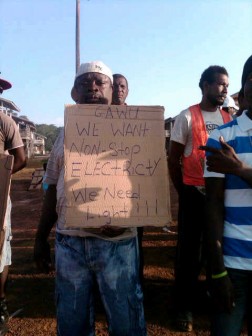Workers of the Demerara Timbers Limited (DTL) at Mabura downed tools today calling for improved electricity and water.

The workers who fall under the Guyana Agricultural and General Workers Union (GAWU), took to the streets of the interior mining concession at Mabura, Region 10 demanding that the government step in and resolve the many issues they are faced with in the employ of the Malaysian-owned timber company. Their main concerns are a lack of potable water and electricity supply.
The workers carried placards which read, “GAWU want non stop electricity, we need light; No sleeping in office and MU stores; No light No wuk; We need light we aint no jumbie we need light; GAWU need light for workers and we serious.”
GAWU representative and employee at DTL Angela Henry said the issue of limited electricity supply to workers living in the township and discolored and heavily sedimented water supply has gotten worse over the past months.
Henry said that around June 2012, the company started rationing the supply of electricity to a maximum of nine hours daily: from 04:00 hrs to 06:00 hrs; 10:00 hrs to 12:00 hrs and 17:00 hrs to 22:00 hrs.
“They claiming that they ain’t get fuel,” she said, quoting a senior manager of the company, who also claimed no definite word could be given to the workers, until the return of the company’s Chief Executive Officer (CEO) Anthony Younge.
“They can’t blame the Linden protest because is long before the protest they start this thing,” said Henry. Prior to June the workers enjoyed 24 hours electricity supply.
Stabroek News understands that the population of the community is over 200 persons. One hundred and twenty, represented by GAWU, are workers in DTL’s mill, office and forest areas; seven are represented by the Guyana Labour Union (GLU) and there are an estimated 100 expatriates.
Henry said the locals feel discriminated against by the company because from the commencement of the rationing of electricity, management has been accommodating the expatriates in the administrative and other working areas building where they would sleep at nights. “And they leave us here in the township to punish,” she said.
There were claims of snakes and bats entering homes in the community when the lights are off at night. “People frighten to come out to even go to their toilets cause bats does attack them and snakes and things going in people house,” related the union representative.
Similar sentiments were expressed other workers. “We need help! Mabura Hill residents are in need of urgent help,” a striking worker said. “The situation was not like this until they came to our country. We are calling on the necessary authorities… the media, ministers and other stakeholders,” to intervene, said the worker who asked not to be named.
On the issue of water, workers say they are convinced that it is hardly treated. “When we talk about it some time back they brought a young man and show him how much of the purifier to put in the water, but when that guy not there it gets none and as of late you could tell that this water not being treated at all,” said Henry who is also a member of the health committee in the area.
“But you know what, they buy water for the expats, you could see the clear line of discrimination,” said another employee who said he has been working with the company over 10 years.
The workers said they will be back in the streets tomorrow for day two and will continue for however long it takes until their demands are met by DTL. Efforts to contact the company’s managers proved futile.





